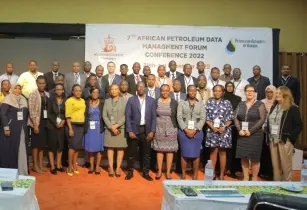The seventh African Petroleum Data Management Forum Conference (APDMF) held at the Commonwealth Resort, Munyonyo – Kampala, called to participating countries to make petroleum data more valuable
The APDMF comprises of representatives from key government entities from different countries concerned with policy, regulatory and commercial aspects of the sector. This forum provides an opportunity for benchmarking on best practices, while sharing experiences among the countries and institutions represented.
While officially opening the APDMF 2022, Ernest Rubondo, the executive director of the Petroleum Authority of Uganda (PAU) challenged the participants to use the forum to chart a way forward on how African countries can make petroleum data more valuable and accessible to those that wish to make use of it.
“The increase in data volumes comes with the challenges of efficiently managing the data and efficiently using the data to make decisions; hence the important need to leverage on the fourth Industrial Revolution (4IR) technologies such as Internet of Things (IoT), cloud computing, and Big Data analytics, among others. However, leveraging 4IR technologies comes with huge investments in both the technologies and the human resources,” said Rubondo.
Rubondo added that “there was need to make Petroleum Data accessible to researchers especially from universities in Africa to undertake more studies that can make the data more valuable to the countries that own it”.
The APDMF is an annual conference organised by the Norwegian Petroleum Directorate (NPD) in conjunction with the petroleum regulatory body of the host country.
Sjøgren Gunnar, project director, NPD, said this this year’s theme, 'Seven Years of cooperation in Petroleum Data Management: Looking to the future', is aimed at helping the countries the NPD cooperates with to leverage on how best they can use their petroleum data.
This year’s ADMF has participants from eight countries that have a corporation agreement for support on data management and storage with the NPD. These include Norway, Ghana, Kenya, Mozambique, Somalia, Sudan, Zanzibar, and Uganda.
Gunnar added that when they started collaborating with Uganda, all data was stored in analogue format, but the country was supported to establish a digital database.
Uganda is now into the development phase of the oil and gas value chain, which includes the setting up of development, production, processing and transportation facilities. Vast quantities of data are therefore expected from the drilling of over 450 development wells in the Kingfisher and Tilenga development projects, as well as from the Refinery and the East African Crude Oil Pipeline projects. The data is expected to be transmitted in real-time from the oil fields and infrastructure projects to the planned Real Time Monitoring Centre (RTMC) at the PAU’s offices in Entebbe.
Rubondo revealed that as the custodian of Uganda’s petroleum and other related data, the authority manages over 50 terabytes of data – a significant portion of this was acquired during the oil and gas exploration phase.
“The electronic data volumes are expected to increase from the current about 50 terabytes to 650 terabytes at the start of oil production in 2025, rising to over 1 petabyte in 2026,” said Rubondo.




